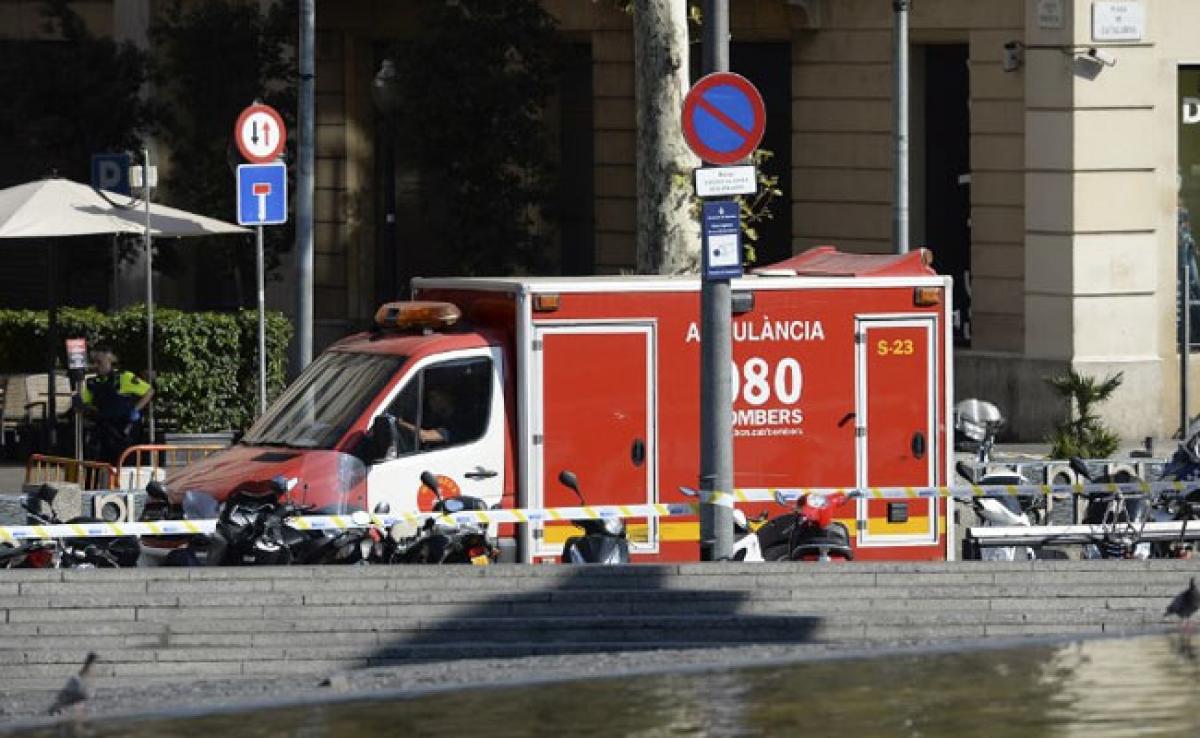Live
- GMR Airports Unveils AI-Powered Digital Twin Platform to Transform Airport Operations
- India poised to become leading maritime player: PM Modi
- Top Causes of Kidney Stones and How to Recognize Silent Symptoms
- India’s renewable energy capacity logs 14.2 pc growth at 213.7 GW
- Winter Session of Odisha Assembly adjourned sine die
- Biden calls Trump's tariff approach 'major mistake'
- After Drama Over Eknath Shinde’s Chief Minister Race, Maharashtra Cabinet Formation Faces New Tensions
- Egyptian FM, Blinken discuss recent developments in Syria
- Iran's supreme leader says Syria's developments result of US-Israeli 'plot'
- Elon Musk to Purchase $100 Million Luxury Mansion Next to Donald Trump's Mar-a-Lago, Report Reveals
Just In

Witnesses in Barcelona told of scenes of chaos and horror, with bodies strewn along the famous Las Ramblas boulevard as other people fled for their lives, screaming in panic.
A van driver ploughed into crowds of pedestrians on Barcelona's most popular street in broad daylight on Thursday, killing 13 people in an attack claimed by the ISIS terrorist group.
Police announced the arrest of two suspects, identified as a Spaniard and a Moroccan, but said the driver was still on the run.
Hours later in Cambrils, a city 120 kilometres south of Barcelona, police said they shot dead "four suspected terrorists" and left another injured in a "possible terrorist attack."
The incident in Cambrils took place in the early hours of Friday, but police gave no further details, nor did they mention whether the shooting was linked to the Barcelona attack.Witnesses in Barcelona told of scenes of chaos and horror, with bodies strewn along the famous Las Ramblas boulevard as other people fled for their lives, screaming in panic.
The rampage in a city hugely popular with tourists from around the world is the latest in a wave of attacks in Europe where vehicles have been used as weapons of terror.
As world leaders united in condemning the carnage, the IS propaganda agency Amaq claimed that it was carried out by "soldiers" from the jihadist group.
"We're united in grief," Spanish Prime Minister Mariano Rajoy said in a televised address after rushing to Barcelona, the biggest city in Catalonia, a region in Spain's northeast whose separatist government is defying Madrid.
"Above all we're united in the firm intention to defeat those who want to take our values and way of life from us."
Regional interior minister Joaquim Forn said 13 people had died and another 100 were injured in what police were treating as a "terrorist attack", warning that the death toll could rise further.
There were at least 18 nationalities among the victims who came from countries as varied as France, Venezuela, Australia, Ireland, Peru, Algeria and China, according to Spain's civil protection agency.
Belgium said one of its citizens had died in the Las Ramblas assault, while The Hague said three Dutch were injured and a Greek diplomat reported three nationals had been wounded -- a woman and her two children.
'Whole street started to run'
Las Ramblas is one of Barcelona's busiest streets, lined with shops and restaurants and normally packed with tourists and street performers until well into the night.
"When it happened I ran out and saw the damage," local shop worker Xavi Perez told AFP.
"There were bodies on the ground with people crowding round them. People were crying. There were lots of foreigners."
Footage broadcast on Spanish television showed a white van, its front crushed, abandoned by its driver on a road surrounded by police cars.
Tom Gueller, who lives on a road next to Las Ramblas said he saw the vehicle speeding along the boulevard.
"It wasn't slowing down at all. It was just going straight through the middle of the crowds in the middle of the Ramblas," he told BBC radio.
Europe's deadliest attack
Spain had until now been spared the kind of extremist violence that has rocked nearby France, Belgium and Germany.
But it was hit by what is still Europe's deadliest jihadist attack in March 2004, when bombs exploded on commuter trains in Madrid, killing 191 people in an attack claimed by Al Qaeda-inspired extremists.
Police said Thursday that one of the arrested suspects was a Spaniard born in Melilla, a Spanish territory on Morocco's north coast, and the other a Moroccan named as Driss Oukabir.
The Spaniard was arrested in Alcanar, about 200 kilometres south of Barcelona, the scene of an explosion in a house late Wednesday that left one person dead and seven wounded and is believed to be linked to Thursday's assault.
"We suspect that they (the occupants) were preparing an explosive device," Josep Lluis Trapero of the regional Catalonia police told reporters.
Thursday's attack drew condemnation from across the globe.
'Revolting attack'
US President Donald Trump condemned the "terror attack" and said the United States will do whatever is necessary to help", adding: "Be tough & strong, we love you!"
France's President Emmanuel Macron -- whose country has witnessed a series of bloody jihadist atrocities including a truck rampage in Nice in July 2016 that killed 86 people -- said his thoughts were with the victims of the "tragic attack".
The Nice carnage and other assaults including the 2015 shootings and bombings on Paris nightspots were claimed by the ISIS, but it is believed to be the first IS claim of an attack in Spain.
Catalonia has the highest concentration of radicalised Islamists in the country along with Madrid and the Spanish territories of Ceuta and Melilla in northern Morocco.
According to the interior ministry, more than 190 "jihadist terrorists" have been arrested since 2015, most of them for propaganda, recruitment for extremist groups or "glorifying terrorism."
On Thursday, the Radicalisation Awareness Network, created by the European Commission, warned that between 1,200 and 3,000 Europeans who lived with and fought for IS in Iraq and Syria could return home.

© 2024 Hyderabad Media House Limited/The Hans India. All rights reserved. Powered by hocalwire.com







